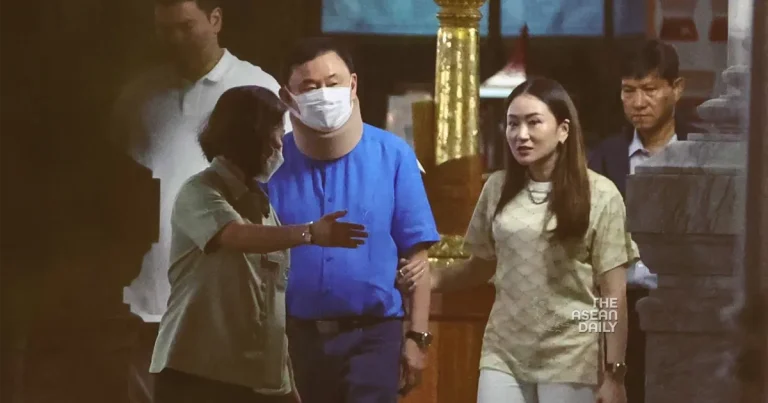14-3-2024 (BANGKOK) In his first public appearances since being freed early from a prison sentence for corruption and abuse of power, Thailand’s controversial former prime minister Thaksin Shinawatra visited his northern hometown on Tuesday, March 14th. The billionaire, twice elected as premier before being ousted in a 2006 military coup, began his day by offering prayers at the Bangkok City Pillar shrine before boarding a private jet to Chiang Mai for a three-day trip.
Upon landing in Chiang Mai – his home city and traditional political stronghold – around 9:40 am local time (10:40 am Singapore time), Thaksin was greeted by his younger sister and her husband. He then proceeded to a park, where supporters had gathered to welcome him.
“I’ve been waiting for him for seventeen years,” exclaimed Mr Samniang Kongpolparn, who had travelled from the northeastern province of Surin to witness Thaksin’s homecoming. Alongside him stood Paisal, a Bangkok taxi driver, who journeyed to see the former politician he affectionately referred to as “the PM of my heart.”
During his stay in the north, the 74-year-old Thaksin plans to meet with family members, supporters, and pay respects at the graves of his relatives.
Earlier that morning, scores of media personnel had camped out in front of the Bangkok shrine where Thaksin, dressed in a blue shirt and neck brace, offered prayers around 5 am. He was accompanied by his daughter Paetongtarn, now the leader of his Pheu Thai party, and her husband.
Thaksin’s return to Thailand in August 2022 marked the end of 15 years in self-imposed exile. Upon his arrival, he was immediately jailed for eight years on charges stemming from his time in power. However, his sentence was promptly reduced to one year by King Maha Vajiralongkorn, and in February, the government declared Thaksin eligible for early release due to his age and health concerns.
The former Manchester City owner’s homecoming coincided with the Pheu Thai party, closely associated with him, assuming power at the helm of a coalition government that includes parties once allied with his old adversaries in the military. This timing fueled speculation of a backroom deal to secure Thaksin’s early release, though the Pheu Thai-led government has denied such claims.
“He is on parole. If he gets something beyond regular regulations, the probation and corrections departments will have to explain themselves,” cautioned Mr Ramet Rattanachaweng, spokesman for the royalist Democrat party, emphasizing that the public would be closely monitoring for any special treatment accorded to Thaksin.
Widely regarded as still wielding significant influence over Pheu Thai, Prime Minister Srettha Thavisin acknowledged upon Thaksin’s release that “everyone in the government is ready to listen” to the veteran leader. Srettha, who is due to visit Chiang Mai on March 15th upon returning from official visits to Germany and France, told reporters in Paris that he would meet with Thaksin “if opportunity and time allow,” according to public broadcaster ThaiPBS.
However, Pheu Thai spokesman Danuporn Punnakanta urged the party’s MPs on March 12th not to visit Thaksin, citing their obligation to be present in Bangkok for the March 14th Parliament session.
Thaksin remains one of the most influential yet divisive figures in modern Thai history. A former police officer turned telecommunications tycoon, he is beloved by millions of rural Thais for his populist policies in the early 2000s but has long been opposed by the country’s royalist and pro-military establishment.
“During Thaksin’s era, I noticed our country had improved. He cleared out the debt for Thailand,” supporter Paisal said at the park in Chiang Mai, reflecting the enduring loyalty Thaksin commands among segments of the population.




